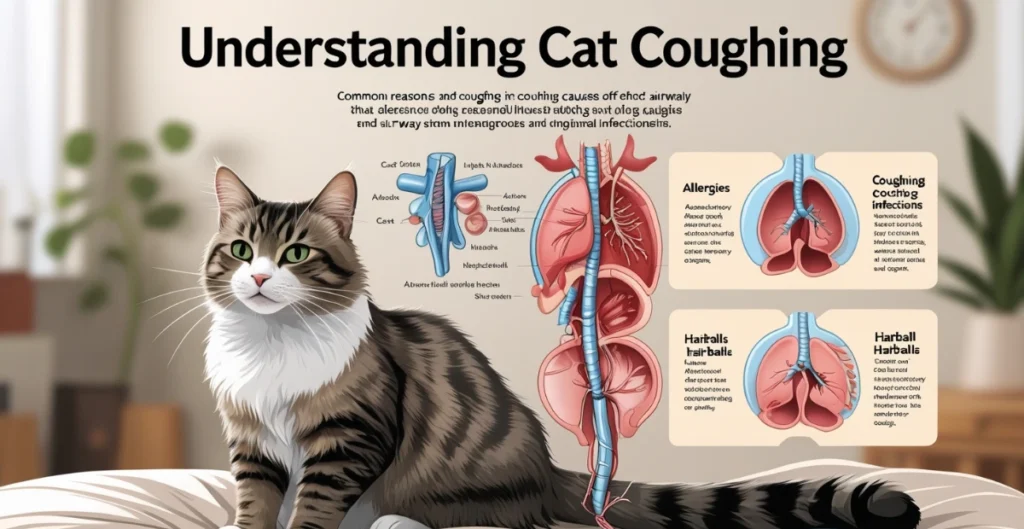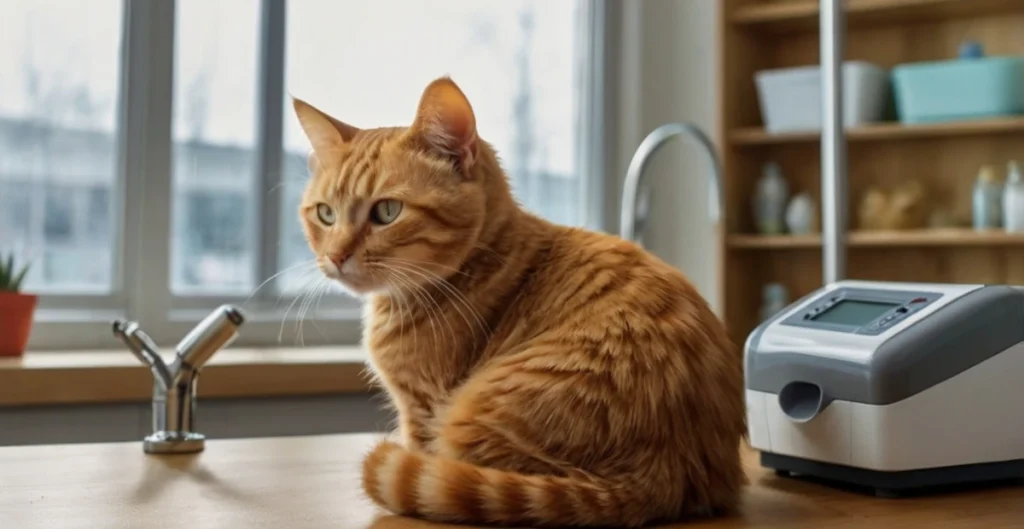When your cat starts coughing, it can be a moment of panic. After all, our cats are not just pets; they are beloved family members. The sudden sound of your furry friend hacking can raise immediate concerns about their health. Whether it’s a persistent cough or just an occasional one, understanding the causes of cat coughing and knowing how to treat it is vital for your peace of mind and your pet’s wellbeing.
advertisement
This article is here to guide you through the most common reasons your cat may be coughing, how to identify the signs, and the remedies that could help. By understanding these causes and their treatments, you can be proactive in ensuring your cat’s comfort and health.
Table of Contents
Understanding Cat Coughing – What Does It Really Mean?

When your cat coughs, it’s important to remember that coughing is a reflex action designed to clear the airways. While occasional coughing is typically not a cause for alarm, persistent coughing could be a sign of an underlying health issue.
advertisement
What Does Cat Coughing Sound Like?
Cat coughing often differs from human coughing in both sound and intensity. It may not be as harsh or disruptive as a human’s but can range from a simple throat-clear to a forceful hacking or honking sound. You might also notice your cat making wheezing noises or showing signs of difficulty breathing during coughing fits.
When Should You Be Concerned About Your Cat’s Cough?
While a single, isolated cough might not be alarming, a few things should raise a red flag. Watch for these signs:
- Persistent coughing: If your cat is coughing regularly over the course of several days, it’s time to take them to the vet.
- Difficulty breathing: If coughing is paired with labored or rapid breathing, it could indicate a serious condition like asthma or a respiratory infection.
- Other symptoms: If the coughing is accompanied by lethargy, loss of appetite, or weight loss, it could be a sign of a systemic issue.
- Coughing up blood: This is a clear warning sign and should prompt immediate veterinary attention.
By being observant and proactive, you can help ensure that any serious conditions are detected early and treated promptly.
Common Causes of Cat Coughing
Cat coughing can stem from a variety of causes. Understanding the potential reasons for your cat’s coughing will allow you to identify the issue and seek appropriate treatment.
1. Respiratory Infections – The Usual Suspect
advertisement
What Is It?
Upper respiratory tract infections (URIs) are one of the most common causes of coughing in cats. These infections are typically caused by viral agents like feline herpesvirus (FHV) or calicivirus, though bacterial infections can also be responsible. These viruses and bacteria irritate the airways, leading to coughing, sneezing, and nasal discharge.
Symptoms to Watch For:
- Sneezing and nasal congestion
- Watery or thick nasal discharge
- Coughing with mucus
- Fever or loss of appetite
Remedies:
- Veterinary treatments: Depending on the cause, your vet may recommend antibiotics for bacterial infections or antivirals for viral infections.
- Hydration: Ensure your cat has plenty of fresh water to help thin mucus and alleviate throat irritation.
- Rest: Keep your cat in a quiet, warm environment to support their immune system.
Most URIs are treatable, but you’ll need to closely monitor your cat’s symptoms. If the condition worsens or doesn’t improve after a few days, schedule a visit to the vet.
2. Asthma in Cats – When Breathing Gets Difficult
What Is It?
Feline asthma is a chronic condition where your cat’s airways become inflamed and constricted, making it difficult for them to breathe. This inflammation leads to coughing, wheezing, and shortness of breath, which can be especially concerning for cat owners.
advertisement
Symptoms to Watch For:
- Frequent coughing or wheezing
- Difficulty breathing (especially during a coughing fit)
- Increased respiratory rate
- Lethargy or reduced activity
Remedies:
- Medication: Cats with asthma are typically treated with steroids to reduce inflammation and bronchodilators to help open the airways. These may be administered as pills, injections, or inhalers.
- Environmental changes: Avoid exposing your cat to cigarette smoke, dust, or other irritants. Air purifiers can help reduce allergens in the home.
- Regular checkups: Asthma is a long-term condition that requires ongoing management. Regular veterinary visits will ensure your cat’s treatment plan stays effective.
With proper care and attention, many cats with asthma can lead a comfortable life. However, you should be vigilant about managing their condition to prevent flare-ups.
3. Hairballs – The Coughing Culprit
What Is It?
Hairballs are another common cause of coughing in cats, especially in long-haired breeds. Cats naturally groom themselves by licking their fur, and in the process, they can ingest hair. Over time, this hair can accumulate in the stomach and form a hairball, which your cat will cough up.
advertisement
Symptoms to Watch For:
- Coughing followed by a retching sound
- Vomiting (typically accompanied by the hairball)
- Excessive grooming or shedding
Remedies:
- Regular brushing: Brushing your cat frequently will help reduce shedding and hair ingestion, particularly in long-haired breeds.
- Hairball control food: Specially formulated cat food designed to reduce hairball formation can also help.
- Hairball lubricants: These are available in gels or pastes and can help your cat pass hairballs more easily.
If hairballs become a frequent issue for your cat, talk to your vet about additional management options.
4. Heartworm Disease – A Less Common but Serious Cause
What Is It?
Though more common in dogs, heartworm disease can also affect cats. Heartworms are parasites transmitted through mosquito bites, and they can cause coughing, difficulty breathing, and other respiratory problems as they travel through the cat’s lungs and heart.
Symptoms to Watch For:
- Coughing, especially at night
- Difficulty breathing or wheezing
- Vomiting or lack of appetite
- Lethargy
Remedies:
- Prevention: The best approach to heartworm disease is prevention. Monthly heartworm medications (in the form of pills, chews, or topical treatments) are recommended for all cats, especially those who live in areas where mosquitoes are prevalent.
- Treatment: If your cat has been diagnosed with heartworm disease, your vet will provide treatment options. This often involves medications to eliminate the parasites and supportive care to manage the symptoms.
Early detection and prevention are key to avoiding the serious complications associated with heartworm disease.
5. Allergies – The Overlooked Trigger
What Is It?
Just like humans, cats can develop allergies to various substances in their environment. Dust, pollen, mold, and certain foods can all trigger coughing, sneezing, and other allergic reactions.
Symptoms to Watch For:
- Coughing, especially during specific seasons or in dusty environments
- Watery eyes or itchy skin
- Sneezing and runny nose
- Loss of appetite
Remedies:
advertisement
- Identify allergens: Try to pinpoint what might be causing your cat’s allergies, whether it’s a certain food or environmental factors like pollen or dust.
- Avoidance: Reducing your cat’s exposure to allergens (such as using hypoallergenic cat food or keeping the home free of dust and mold) is the first line of defense.
- Antihistamines: Your vet may prescribe antihistamines or steroids to reduce the allergic response.
While allergies can be challenging, with the right management, you can help alleviate your cat’s symptoms and reduce their discomfort.
6. Foreign Objects – When Curiosity Leads to Coughing
What Is It?
Cats are curious by nature, and sometimes that curiosity leads them to inhale small foreign objects or irritants that can get stuck in their airways, causing coughing. Common items include dust, plant material, or even small toys.
Symptoms to Watch For:
- Sudden onset of coughing
- Gagging or retching sounds
- Difficulty breathing or distress
Remedies:
- Emergency care: If you suspect your cat has inhaled a foreign object, take them to the vet immediately. Foreign objects can block airways and cause serious harm if not removed quickly.
- Prevention: Keep small items and potential choking hazards out of your cat’s reach. Maintain a safe environment to reduce the risk of accidental inhalation.
When to Seek Veterinary Help

If your cat’s cough lasts for more than a few days or is accompanied by other concerning symptoms like difficulty breathing or loss of appetite, it’s crucial to seek veterinary attention. Your veterinarian will perform a physical examination and may use diagnostic tools like x-rays or blood tests to determine the cause of the cough. Early intervention is key to ensuring your cat’s health and comfort.
Home Remedies and Ways to Help Your Cat Recover
While professional treatment is essential for certain conditions, there are several ways you can help your cat at home to support their recovery.
1. Keep Your Cat Hydrated
Water helps thin mucus and soothe irritated airways, so make sure your cat has access to fresh water at all times.
2. Use a Humidifier
A humidifier can add moisture to the air, helping to relieve dry, irritated throats and easing coughing.
advertisement
3. Provide a Quiet, Stress-Free Environment
Stress can exacerbate coughing and other symptoms, so provide your cat with a calm, quiet space where they can rest and recover.
Conclusion – Keep Your Cat Comfortable and Healthy
When your cat starts coughing, it’s essential to be observant and proactive in identifying the cause. By understanding the potential reasons behind your cat’s coughing and working closely with your vet, you can ensure that your feline companion gets the appropriate treatment. Whether it’s a simple hairball or a more serious condition like asthma or a respiratory infection, prompt action will help your cat feel better faster.
Take Action:
If your cat’s coughing persists or worsens, don’t wait—schedule a visit to the vet to get a diagnosis and start a treatment plan that works best for your cat’s specific needs.


